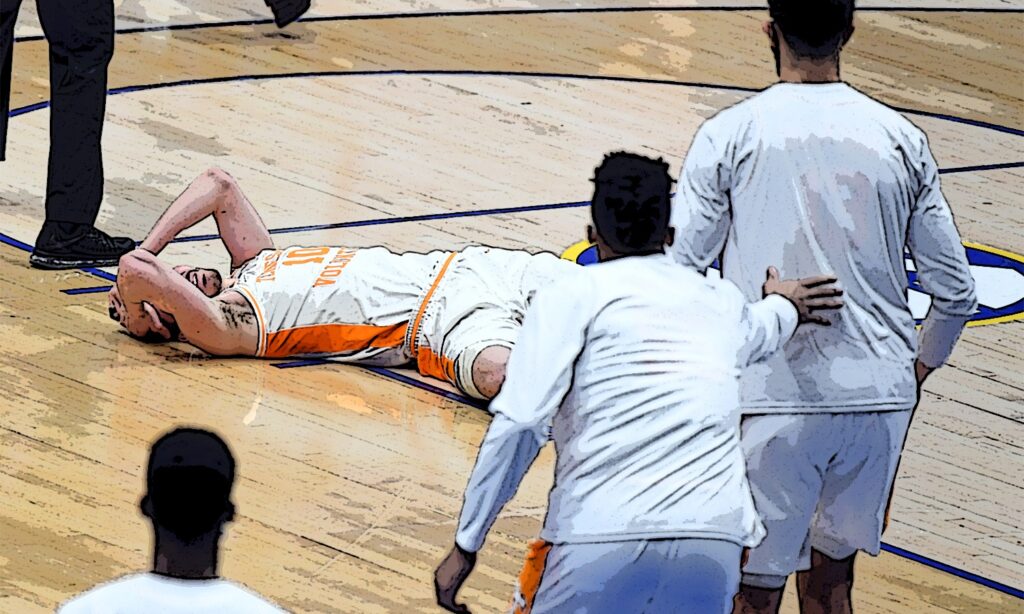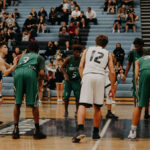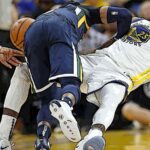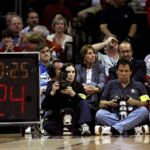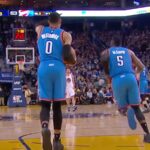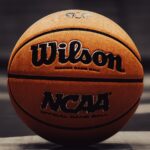Just like in the NBA, College Basketball has varying levels of disciplining players for illegal contact.
Illegal contact is more specifically known as a foul. There are two main types of fouls in basketball: personal and flagrant.
Personal fouls are known as common game fouls such as blocking, charging and reaching in.
Players are looking to steal the ball or gain better positioning, which can lead to illegal contact and a whistle from the referee.
In college basketball (NCAA), players are allowed up to 5 personal fouls in a game before facing an ejection.
It’s one less personal foul than the NBA permits because the games are slightly shorter in length (40 minutes instead of 48 minutes).
As a note, some diehard fans would define flagrant fouls as a type of personal foul, just more severe in contact and resulting consequence.
But we’ll get into more specifics shortly.
Meanwhile, there are two types of flagrant fouls: Flagrant 1 and Flagrant 2.
Flagrant 1 fouls are typically called during a live play incident, involving extreme and intentional contact or non-excessive contact above the shoulders.
So, how does that differentiate from Flagrant 2 fouls? For that, let’s get right to your question…
What is a Flagrant 2 Foul in College Basketball?
In College Basketball, a Flagrant 2 foul is considered a severe or excessive contact with an opponent. The offender is automatically ejected from the game, while the opposition is given two free throws and subsequent possession of the ball. Flagrant 2 fouls are unique in that they can be called both during live play and deadball.
The type of illegal play deemed flagrant 2 includes extreme contact with the opponent above the shoulders during live play.
Furthermore, any severe, intentional contact during deadball will lead to the same result.
As you may have figured out, flagrant 2 fouls are the most punitive foul a player can be assessed with during a game.
Unlike a Flagrant 1, there is zero chance the player remains in the game.
However, if the referee deems the call was too harsh upon in-game review, the Flagrant 2 may be downgraded.
In this case, the player can remain in the game. Most likely, the foul would be reduced to a Flagrant 1 and the player will be put on notice.
Another flagrant foul within the same game also will ultimately lead to an ejection.
Do you get suspended for a Flagrant 2 foul in College Basketball?
Flagrant 2 fouls are automatically subject to league review for potential further discipline. Players may get off without supplementary punishment, meaning no added suspension.
On the other hand, if the contact was intentional and harsh enough, the offender can get suspended for additional games.
Examples of Flagrant 2 Fouls in College Basketball
In the following clip, you can see the player commits two hits above the shoulder. One is a forearm shove to the face, followed by a violent elbow.
Omar Payne was ejected from the game for a flagrant 2 as can be heard at the end from the referee.
In the next example, the referees had to review the play to deem the severity of the foul by North Carolina's Leaky Black on Terquavion Smith.
They most likely charged Black with a flagrant 2 because Smith had to leave the game on a stretcher.
In the play, you can see that Black shoved his arm in Smith's face on the attempted block.
Smith sustained both a neck and elbow injury on the play.
Final Thoughts
College basketball rules for flagrant fouls are similar to NBA rules, with the exception of player fines.
Since the college or NCAA players don’t get paid, the worst-case scenario is a multi-game player suspension following an ejection.
As a reminder, the main distinction for Flagrant 2 fouls is that they can be assessed for both live play and dead ball incidents.
Any type of violent act that can lead to injury or fighting is the most likely cause of a flagrant 2 call.
The incident can lead to punishment beyond the initial offender, especially if the opposition decides to retaliate or if there is a bench-clearing brawl.
Players should take flagrant 2 fouls seriously, as it can lead to permanent league suspension and might affect their career and future livelihood.
